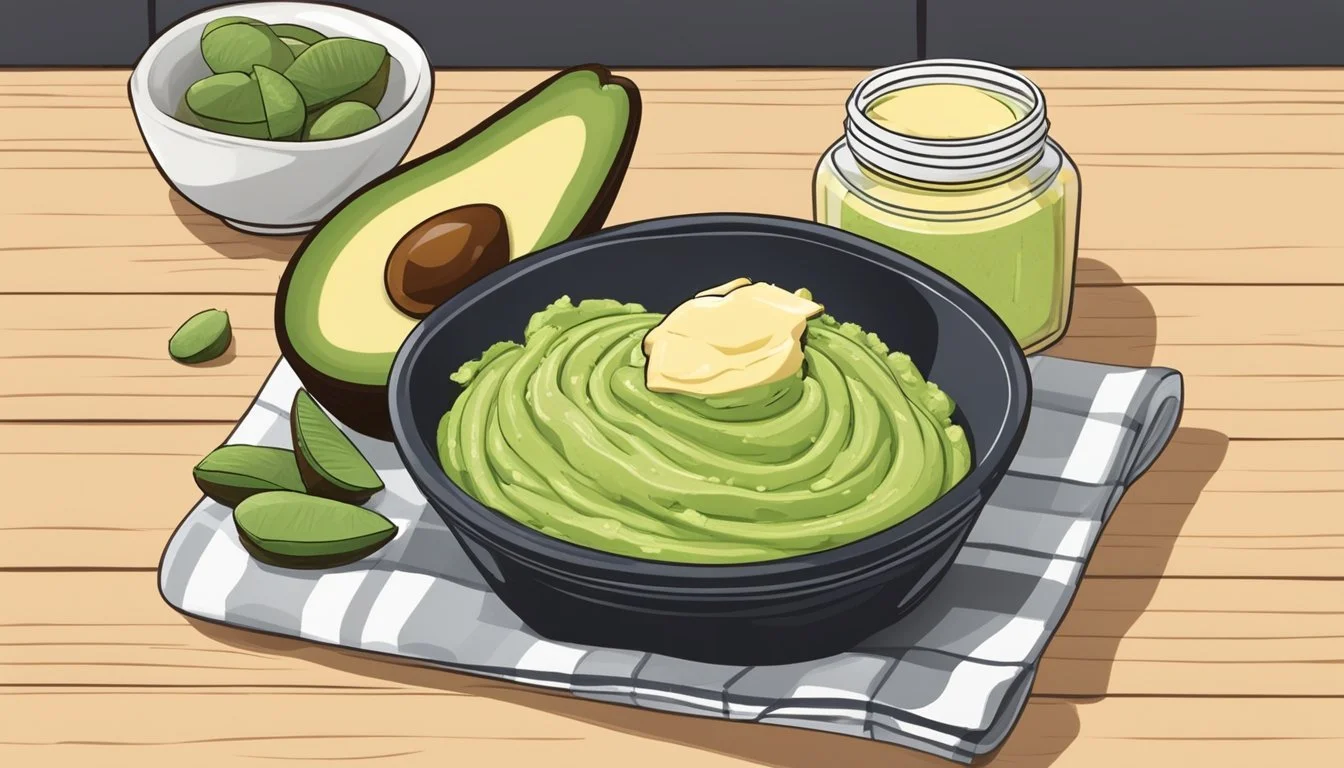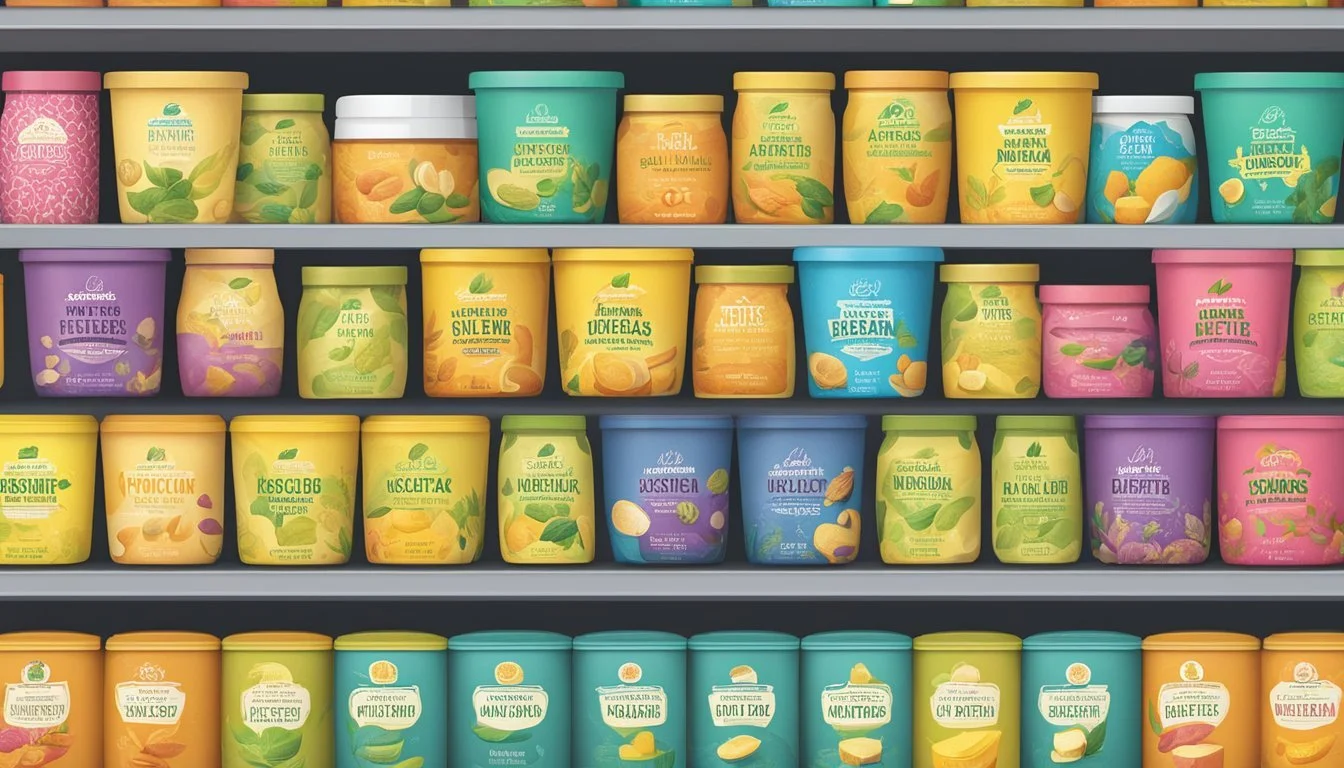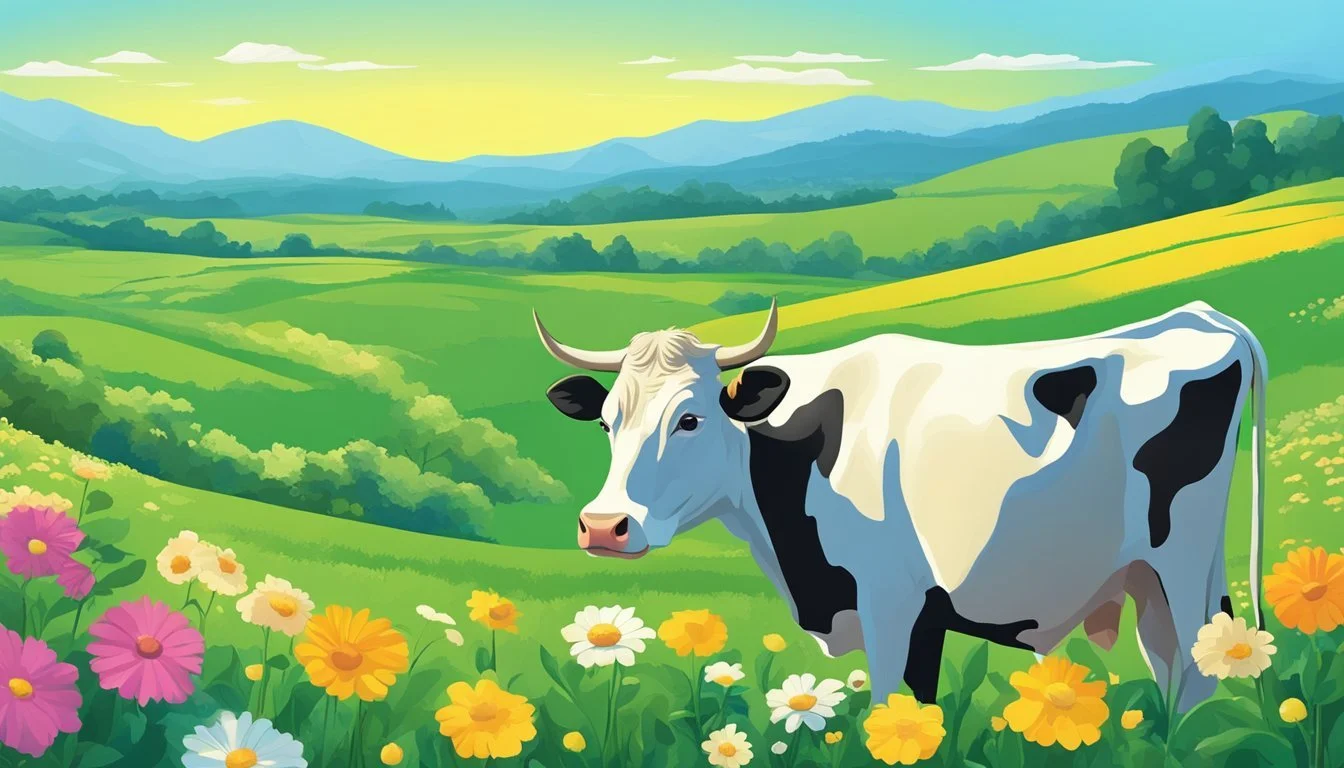Vegan Butter Substitutes
Your Guide to Dairy-Free Spreads
Vegan butter substitutes offer an alternative for those who follow a vegan diet, are lactose intolerant, or are looking to reduce their intake of animal products. Unlike traditional butter, which is a dairy product, vegan butter substitutes are made from plant-based ingredients. They cater to the increasing demand for dairy-free options that maintain the taste and functional characteristics of butter. Among the variety of substitutes available, options range from commercially prepared vegan butter alternatives to simple plant-based oils and other kitchen staples that mimic butter's richness and flavor profile.
The choice of vegan butter substitutes can greatly influence the taste and texture of culinary creations. Plant-based oils, such as olive, coconut, and avocado oil, are commonly used due to their healthful fats and versatility in both cooking and baking. For those seeking a one-to-one butter replacement, specially formulated vegan butters are available which are designed to perform similarly to dairy butter in recipes. Natural ingredients like mashed bananas or applesauce can also serve as butter replacements, adding moisture and binding properties to baked goods.
Understanding the properties of various vegan butter substitutes is key to selecting the right option for a specific recipe. Each alternative brings its own unique flavor and set of benefits, from heart-healthy fats found in avocados to the neutral taste of refined coconut oil. Whether one is vegan or simply exploring dairy-free alternatives, these substitutes are an integral part of modern cooking and baking, allowing for versatility and innovation in the kitchen without compromising on quality and taste.
Understanding Vegan Butter
Vegan butter stands as a plant-based alternative to traditional dairy-based butter, crucial for those pursuing a vegan diet or seeking to reduce animal products in their meal preparation. Its unique composition aims to mirror the properties of butter without any animal-derived ingredients.
Composition and Properties
Vegan butter typically comprises a blend of plant-based oils such as olive, avocado, coconut, or palm kernel oils. These oils are emulsified with water to achieve a consistency similar to dairy butter. It may also contain proteins, such as soy or pea, and emulsifiers like lecithin to stabilize the mixture. Various fats, including both saturated and unsaturated forms, are present to replicate the mouthfeel and culinary properties of traditional butter.
Saturated fats: Usually less than in dairy butter, but can vary.
Unsaturated fats (healthy fats): Typically greater quantities found here, contributing to heart health.
Health Implications
Vegan butter's health implications hinge on its fat composition. With no cholesterol inherent to its plant-based nature, it often poses a healthier option for maintaining cholesterol levels. However, users should be cautious, as some vegan butter products may have high levels of saturated fats.
Heart Health: A regular intake of plant-based unsaturated fats may benefit heart health.
Saturated Fats: Overconsumption can still pose health risks despite the plant-based source.
Flavor and Texture Profiles
The flavor of vegan butter is designed to be as close as possible to that of dairy butter, with variations depending on the source of the fats used. The texture aims to provide a comparable level of moisture and spreadability in culinary applications. Many brands are able to achieve a smooth consistency that melts akin to traditional butter, affecting both texture and flavor positively.
Flavor: Often neutral, can be influenced by the primary oil used.
Texture: Engineered to mimic dairy butter, providing a similar tactile experience.
Comparing Butter Substitutes
When considering vegan butter substitutes, it is essential to understand the taste, texture, and nutritional profiles, as well as how they perform in various recipes. Here, we compare some of the most common substitutes to help you make an informed choice.
Vegan Margarine vs. Vegan Butter
Vegan margarine and vegan butter are similar in that they both aim to replicate the functionality of dairy butter. Vegan margarine typically includes a blend of vegetable oils and may contain emulsifiers, salt, and natural colorings. It's designed for spreading and general cooking, but it may contain more water content which can affect baking outcomes.
Vegan butter, on the other hand, is a newer product designed to closely mimic the taste and texture of traditional butter. It often uses coconut oil as a base and incorporates other flavors and nutritional yeast to achieve a more butter-like flavor profile. In baking, vegan butter can often be used in a 1:1 ratio with dairy butter, providing a similar richness and moisture.
Nut-Based Butters
Nut-based butters such as almond butter and peanut butter offer a different set of characteristics, mostly in terms of taste and nutrients. They are not designed to behave like traditional butter but can be used as spreads and in specific recipes that benefit from their nutty flavor.
Nut Butter Saturated Fat Calories Nutrients Almond Butter Lower Moderate Vitamin E, Magnesium Peanut Butter Moderate High Protein, Vitamin B6, Niacin
Since they do not mimic butter's properties, they are not typically used in dishes that require the fat to act as a binding or leavening agent.
Plant-Based Oils Overview
Plant-based oils are diverse and each type can bring unique qualities to the table. When substituting for butter, consider the flavor and smoke point of the oil as it can significantly influence the taste and cooking process.
Olive Oil: A heart-healthy oil with a distinct flavor, best used in savory dishes or where its taste can be appreciated.
Coconut Oil: Solid at room temperature and high in saturated fat, this oil can provide the richness associated with butter.
Avocado Oil: A mild, nutrient-rich oil suitable for high-heat cooking.
Canola and Vegetable Oils: Neutral oils that are versatile for both cooking and baking.
The choice of oil often depends on the desired outcome, flavor profile, and cooking method. For instance, extra virgin olive oil is excellent for dressings or dips, while refined coconut oil is a go-to for creating vegan "buttermilk" for baking due to its ability to solidify and provide moisture when used in place of butter.
Cooking and Baking with Substitutes
When choosing vegan butter substitutes for cooking and baking, it's essential to consider how these alternatives will affect flavor and texture. For baking, alternatives should complement sweet flavors and tender textures, while for cooking, they need to withstand higher temperatures and enhance savory dishes.
Substitutes in Baking
In the realm of baking, substitutes must perform similar functions to butter, such as creating flakiness in pie crusts or moistness in banana bread. For example, unsweetened applesauce can be used to add moisture to muffins without altering flavor too much. When making cookies or cakes, it's often best to opt for oils with a neutral flavor, like canola or vegetable oil. Refined coconut oil is another favorite as its solid state at room temperature helps to mimic the creaming process of butter which is vital for texture.
Vegan Substitute Best for Note Unsweetened applesauce Muffins, banana bread Adds moisture Refined coconut oil Cakes, cookies, biscuits Solid at room temp Vegetable oil Muffins, pancakes Neutral flavor
Substitutes in Cooking
For cooking, especially sautéing or frying, one must consider the smoke point of the substitute to avoid burning. Olive oil is a common substitute with a moderate smoke point, ideal for light sautéing but may not be suitable for high-temperature frying. Avocado oil has a higher smoke point and adds a creamy texture that works well for savory dishes. For added flavor, one might use oils with distinct tastes, such as sesame oil, in moderation to accentuate the savoriness of a dish.
Substitute Smoke Point Good for Flavor Contribution Olive oil Moderate Sautéing Adds a fruity note Avocado oil High Frying, sautéing Creamy and mild Sesame oil Moderate-high Flavor accent Nutty, rich
Homemade Vegan Butter Recipes
Creating homemade vegan butter can be a rewarding experience as it allows full control over flavor and ingredients. A basic recipe might include a blend of melted refined coconut oil and canola oil, whisked with apple cider vinegar curdled plant milk to make vegan "buttermilk." Ingredients like nutritional yeast can add a cheesy flavor, while turmeric gives color and sea salt enhances the overall taste.
Ingredient Purpose Refined coconut oil Base fat, solid at room temp Canola oil Neutral flavor, liquid at room temp Apple cider vinegar Adds tanginess, helps curdling Plant milk Provides the 'milky' aspect Nutritional yeast Adds a cheesy, umami flavor Turmeric For color Sea salt Enhances flavor
By carefully selecting ingredients, one can closely replicate the qualities of traditional butter for both cooking and baking applications.
Fruit-Based Substitutes
Fruit-based substitutes can offer a variety of textures and flavors when used in place of butter. They typically provide added health benefits such as fiber and can introduce natural sweetness to recipes.
Using Avocado as Substitute
Avocado, with its high-fat content, can be mashed to create a creamy texture, which is excellent for spreading and baking. When one uses mashed avocado as a substitute, they can generally replace butter with an equal amount of avocado. This swap not only reduces the dish's saturated fat content but also infuses it with avocados' beneficial monounsaturated fats.
Texture: Creamy and smooth, similar to softened butter.
Flavor Profile: Subtle, not overpowering, which makes it versatile.
Usage Tips:
Ideal for: Savory dishes, baked goods.
Ratios: 1 cup of butter = 1 cup of mashed avocado.
Using Bananas and Applesauce
Bananas provide natural sweetness and moisture to baked goods. One can replace butter with mashed banana in a 1:1 ratio, especially in recipes like muffins and quick breads. However, the distinct flavor of bananas will carry through, so it’s best used in recipes where banana flavor is compatible.
Texture: Adds moisture to baked goods.
Flavor Profile: Sweet with a noticeable banana taste.
Applesauce can be used as a butter substitute to not only add sweetness but also to introduce additional fiber into the recipe. It is a particularly good option for making lighter versions of recipes since it has fewer calories and less fat.
Texture: Moist and tender crumb in baked goods.
Flavor Profile: Mildly sweet and slightly fruity.
Usage Tips:
Ideal for: Sweet baked goods, such as cakes and muffins.
Ratios: 1 cup of butter = 1 cup of applesauce (adjust sugar in the recipe accordingly).
Other Vegan Alternatives
In the realm of vegan cooking, a variety of plant-based substitutes exist that cater to a diverse set of dietary preferences and cooking applications. They range from solid fats ideal for baking to protein-packed spreads suitable for snacking.
Vegetable Shortening and Its Uses
Vegetable shortening, commonly derived from hydrogenated vegetable oil, serves as a vegan substitute that provides a similar texture to traditional butter. Culinary experts often utilize shortening in pie crusts and other baked goods where a flaky texture is desired. Due to its high melting point, it retains its structure, resulting in a desirable texture.
Legume-Based Spreads
Legumes offer a spreadable alternative rich in protein and fiber, with hummus being a prominent example. Made from chickpeas, tahini, and various seasonings, hummus pairs well with veggies and crackers. Other legume-based spreads can include various beans like black beans or lentils, each contributing to a nutritious vegan diet.
Nuts and Seeds
An array of spreads derived from nuts and seeds can substitute for butter, and these include options such as peanut, cashew, and almond butters. Beyond spreads, finely ground nuts can enhance the texture and nutritional profile of dishes. They are excellent sources of healthy fats and are often used to add creaminess in vegan recipes.
Peanuts: A staple in many diets, peanut butter is celebrated for its rich flavor and versatility.
Cashews: These nuts are often soaked and blended to create dairy-free cheese and creamy sauces.
Almonds: High in fiber and vitamin E, almonds provide a robust flavor and are used in various forms, from butter to almond milk.
Brands and Commercial Products
When searching for vegan butter substitutes, consumers have an array of brands to choose from, each offering products with different plant-based ingredients designed to mimic the flavor and functionality of traditional dairy butter.
Market Leaders in Vegan Butter
Earth Balance: Known for its classic taste and spreadability, Earth Balance's line of vegan buttery spreads are made from a blend of plant-based oils and are available in several varieties, including soy-free and organic options.
Melt Organic: Melt Organic offers rich and creamy butter substitutes that boast a blend of organic oils such as coconut and flaxseed, catering to those looking for non-dairy options with a health-forward approach.
Wayfare: With a focus on simple ingredients and a rich, creamy texture, Wayfare's dairy-free butter is a popular choice among vegans for both cooking and as a topping.
Nutiva: Highlighting organic coconut oil as their base, Nutiva creates plant-based spreads that include the health benefits of medium-chain triglycerides, appealing to those tracking their nutritional intake.
Specialty and Artisan Options
Homemade Vegan Butter: Vegan butter can be made at home using a blend of plant-based oils like coconut and canola, often enhanced with turmeric for color and flavor, an approach appealing to those preferring DIY methods.
Specialty brands and artisanal creators often craft vegan butter with unique flavor profiles or texture characteristics, perfect for those looking to explore beyond mainstream options.
Nutritional Considerations
When choosing vegan butter substitutes, one should be mindful of their nutritional composition, as it can significantly differ from dairy butter in terms of caloric content, fat types, and vitamin profile.
Caloric and Fat Content
Traditional dairy butter is high in calories and butterfat, particularly saturated fats, which may raise cholesterol levels when consumed in excess. Vegan butter substitutes can vary widely in their caloric and fat content. For example, oils like olive oil or coconut oil are primarily composed of fats, though they often contain healthier fats. Here's a comparison:
Dairy Butter: High in saturated fats; about 100 calories per tablespoon.
Coconut Oil: Saturated fats present but contains medium-chain triglycerides (MCTs); roughly 120 calories per tablespoon.
Olive Oil: High in monounsaturated fats ("healthy fats"); around 120 calories per tablespoon.
Vitamins and Essential Nutrients
While dairy-based butter contains nutrients like vitamin A and D, vegan substitutes often lack these unless fortified. Some vegan butters are enriched with vitamin E and other essential nutrients. Nut butters, such as almond butter, inherently contain a mix of nutrients that are beneficial for health. It is essential to read labels to understand what vitamins and nutrients may be present in a vegan butter substitute.
Balancing Diet and Flavor
The choice of vegan butter substitute not only impacts flavor but also overall diet. Ingredients like avocado oil and flaxseed oil provide a rich flavor and are sources of healthy fats that can benefit heart health. They provide energy and could have additional health benefits due to their nutrient profiles. Consumers should consider both flavor preferences and dietary needs when selecting an alternative to traditional butter.
Environmental and Ethical Considerations
The choice of vegan butter alternatives over traditional dairy butter reflects both environmental sustainability and ethical treatment of animals. This discernment often guides consumers toward brands like Earth Balance and Melt Organic, known for their plant-based spreads.
Plant-Based Impact on Environment
Sustainable Farming: Vegan butter alternatives typically require plant-based inputs that vary in their environmental footprint. Brands such as Earth Balance and Melt Organic claim to use oils derived from sustainably harvested sources. The production of these plant-based substitutes generally consumes fewer natural resources than dairy farming, leading to a lower environmental impact.
Greenhouse Gases: Dairy production is associated with high greenhouse gas emissions, notably methane. In contrast, plant-based substitutes can contribute to a reduction in these emissions.
Land Use: Cultivation of the crops for vegan butter often results in less land usage when compared to the space required for raising cattle.
Water Usage: The water requirement for plant crops is substantially lower than that needed for dairy production.
Palm Oil Concerns: Despite this, it's crucial to note that some vegan butters contain palm oil, a controversial ingredient due to deforestation and habitat destruction. Consumers looking for the most sustainable options often seek products without palm oil or from certified sustainable sources.
Ethical Issues with Dairy Production
Animal Welfare: The fundamental ethical consideration for vegan consumers is the well-being of animals. Traditional butter production involves milking cows, which can result in the animals living in restrictive conditions. Vegan butter alternatives exclude all animal-derived components, aligning with a cruelty-free ethos.
Dairy Practices: Intensive dairy farming practices have been criticized for their approach to animal care, including the use of hormones and the separation of calves from their mothers.
Vegan Stance: Vegan products, like vegan butter, emerge as a response to these practices, as they do not contribute to the exploitation of dairy cattle.
Consumers' Ethical Choice: People who choose vegan substitutes do so not only out of concern for the environment but also to endorse a system that respects animal rights and welfare. Vegan butters allow individuals to enjoy a butter-like experience while adhering to their ethical values.





